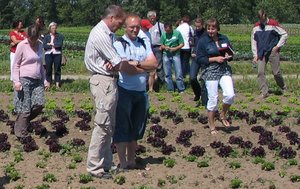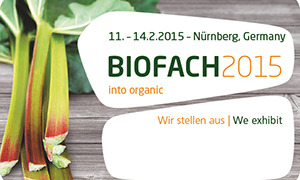ICROFS´research dissemination
Dissemination of research results is a central activity at the International Centre for Research in Organic Food systems. Dissemination is achieved mainly though web-portals, electronic newsletters, presentations and collaborative networks.
With ICROFS’ international status, mandate and board from June 2008, a natural focus change occurred in the centre’s communication strategy towards dissemination to international target groups. However, ICROFS is maintaining and developing its communication to both old and new players in the entire Danish organic sector.
ICROFS regulations states, that the center is committed to: "disseminating the results of the organic research to relevant users and national and international forums as well as promoting knowledge and understanding of the characteristics of organic food systems to international organizations, including the organic famers, aquaculture growers, advisors, fabrication companies, consumers and governments”.
The centre must secure, that the results of the organic research is easy to access for all parts of the food industry.
Moreover the centre must promote og disseminate knowledge both nationally and internationally regarding the organic food systems impact on the environment, the nature and biodiversity, animal welfare, health, food security and food quality.
Research and development activities within organic farming and food systems are conducted in close dialog with farmers, advisors and consumers.
At the same time, different institutions and research groups must collaborate at the centre to be able to produce results, which can be used by researchers and advisors within organic as well as conventional farming. Finally the obtained knowledge must be public accessible. Therefore, the centre uses a number of different channels for communication.
The institutions and research groups, which take part in ICROFS research programmes, have different traditions within research in organic farming. Also the institutions traditions as regards information and dissemination are varying. More of the participating institutions are for instance publishing their own journals and reports, which addresses specific target groups directly; advisors, veterinarians, companies etc. Other uses the more traditional channels such as journals and specialist journals.
Overview of the research
ICROFS’ information activities is not replacing existing channels for publishing and dissemination of technical knowledge - on the contrary it is the intention to support the existing channels, which distribute professional knowledge about organic farming. As a coordinating centre, ICROFS aims at provide a more collective overview of the research and at the same time address a broader segment of target groups. Finally, ICROFS provides the participating institutions the opportunity to make use of ICROFS expertise and information channels.
Within the framework of ICROFS a number of initiatives are set in motion, with the purpose of strengthen the total information effort about research in organic farming. In that connection, it is important to choose appropriate communication tools to ensure that scientific discoveries and perspectives actually reach the various interest groups.
Publications
ICROFS is publishing both internal and international newsletters about research within organic farming and food systems, the centre has agreements regarding regular contributions for professional magazines, is producing fact sheets to broader target groups and is continuously making information material as folders and posters.
Further, ICROFS is co-responsible for the international archive Organic Eprints together with FiBL and BÖL. The online database, “Organic Eprints” was established in 2002 as a service for the community of researchers within organic farming and food systems.
The centre is also available if there is a need for counselling and guidance to the research environments as regards communication and dissemination, e.g. in connection with arrangement of meetings, workshops, conferences, publication of reports, taking part in exhibitions etc.
ICROFS has produced reports about subjects within the research in both Danish and English and helps to gather and synthesise information in connection with the authorities' planning within the field of organic farming.

